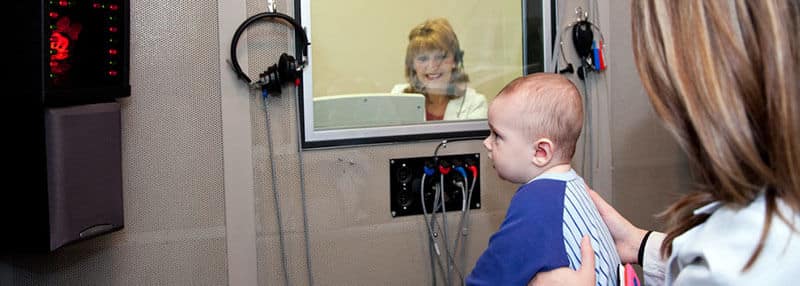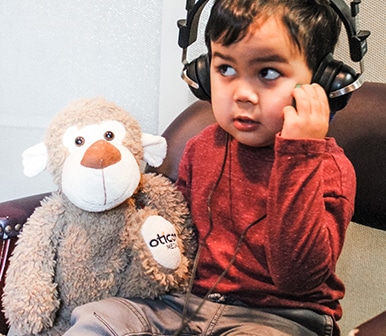Hearing Loss in Adults
Hearing loss affects millions of Americans every year. By the age of 65, about 1 in 3 individuals have some type of hearing loss, and that number is growing rapidly. Of those individuals, unfortunately only about 30% actually seek help. That means that about 70% of individuals live with untreated hearing loss.

The consequences of untreated hearing loss are vast and can be detrimental to one’s health. Research has shown that untreated hearing loss is highly correlated with Alzheimer’s disease, other forms of dementia, depression, cognitive decline, and other health problems related to social isolation; however, there is hope! Treating your hearing loss can bring about an entirely different outcome, and you can live a full life enriched by the sounds of your loved ones.
Signs of Hearing Loss
This simple quiz can help get you started on your path to understanding your hearing health.
1. Does it often seem like people are mumbling?
2. Does your family tell you that you turn the TV up too loud?
3. Do you often have to ask people to repeat themselves?
4. Do you constantly hear a ringing or buzzing sound in your ears?
5. Do you have difficulty hearing during phone conversations?
6. Can you hear, but just not understand?
7. Do you often feel isolated from conversation, especially in group settings?
8. Do you have a significant history of noise exposure?
9. Do you have trouble hearing with a lot of background noise?
10. Is there a history of hearing loss in your family?
Causes of Hearing Loss
Hearing loss can be caused by many factors, some include:
- Cerumen (earwax) blockage - we can remove this on the spot!
- Outer or middle ear infections
- Permanent sensorineural hearing loss
- Presbycusis (aging) “Just a little hearing loss for my age” is not “normal”
- Otosclerosis
- Ménière's disease
- Genetics (family history)
- Perforated ear drum (tympanic membrane)
- Head trauma
- Significant history of noise exposure
- Ototoxicity
What Should I Do If I Have Hearing Loss?
Get a hearing evaluation as soon as possible from a licensed audiologist! If you’re worried about the process, call us first and we will take care of the rest. There is no need to stress about having your hearing tested.
Pediatric Hearing Loss
Approximately 1 in every 1,000 children are born with hearing loss. About 50-60% of these cases can be attributed to genetics. Other cases can be attributed to infections during pregnancy, such as Cytomegalovirus (CMV), other environmental causes, or complications after birth.

What should you do if your child has hearing loss?
Be proactive, seek help, and take action!
If you are concerned your child might have hearing loss, contact us for a full hearing test immediately. If your child has hearing loss, we can help with approaches that are specialized to pediatrics. Management of childhood hearing loss should take a TEAM approach. We will work with you and your child to provide the best treatment and intervention services possible.
Hearing loss can affect all aspects of a child’s development, especially speech, language, and social skills. Early intervention is KEY! The earlier services are initiated, the better. If you suspect your child has hearing loss, trust your instincts and let us help guide you and your child to a better life.
Risk Factors for Hearing Loss
There are several risk factors that can occur that place an infant “at-risk” for hearing loss in the first three years of life:
- Prematurity
- Low birth weight
- Stay in the NICU for > 5 days
- Family history of hearing loss
- In utero infections such as CMV, rubella, herpes, syphilis, and toxoplasmosis
- Has a neurological disorder that may be associated with hearing loss, such as Hunter Syndrome
- Has any syndromes associated with hearing loss or progressive/late-onset hearing loss
- Use of Ototoxic Medications
- Hyperbilirubinemia that requires exchange transfusion
- Any craniofacial anomalies including those that involve the pinna, ear canal, or ear tags
If your child is between the ages of 0 and 3 years and has any of the risk factors listed above, a hearing re-evaluation should be completed every six months until they are three years old for the purpose of monitoring hearing.
Other Risk Factors for Children of All Ages
A hearing evaluation is recommended if you observe one or more of the following:
- Otitis media with effusion, such as fluid in the ears or ear infections
- Concern regarding speech or language development
- Speech is unclear
- Does not follow directions
- Difficulty hearing in the presence of background noise
- Mumbled speech
- Frequent need for repetition, constantly asking "huh?" or "what?"
- Watching TV at elevated volumes
- Ear wax (cerumen)
- Head trauma, especially in the basal skull
- Chemotherapy
- Meningitis


